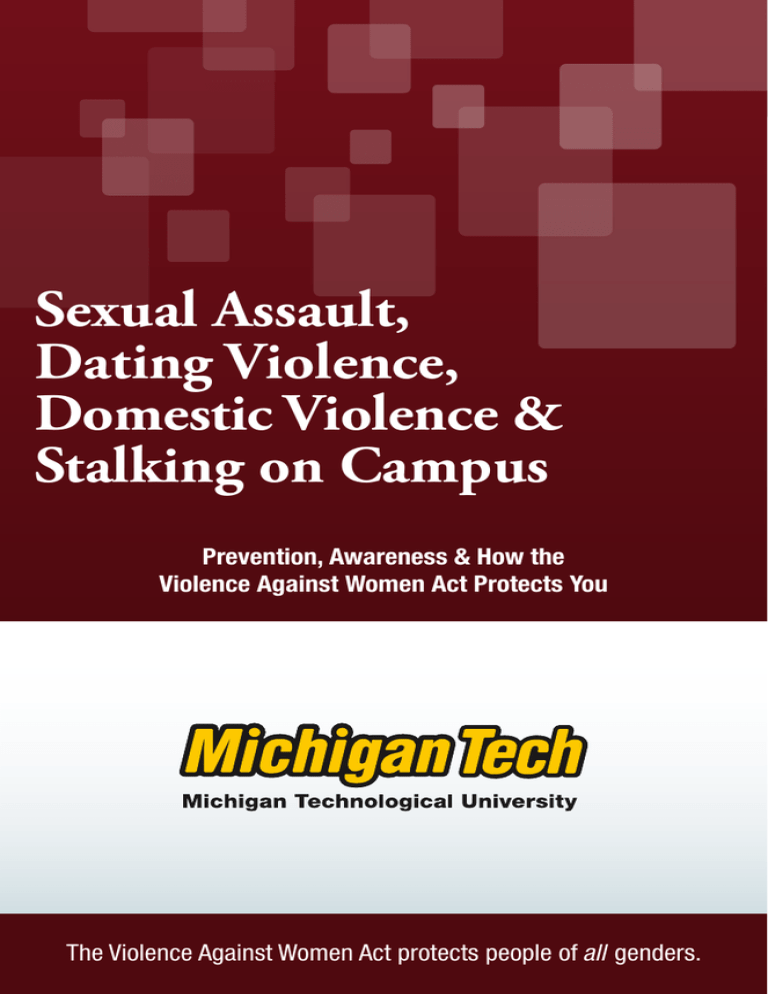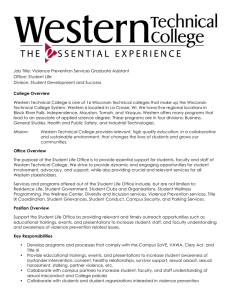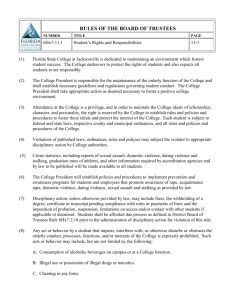
Sexual Assault,
Dating Violence,
Domestic Violence &
Stalking on Campus
Prevention, Awareness & How the
Violence Against Women Act Protects You
The Violence Against Women Act protects people of all genders.
Michigan Technological University
Protection and Prevention
P
rotecting you from sexual and relationship violence — and helping you better understand
how to protect yourself and others — is a key campus concern. You should never have to
contend with sexual assault, dating violence, domestic violence or stalking — and we strictly
prohibit these crimes. They have no place within our community.
The federal Violence Against Women Reauthorization Act (VAWA) put new obligations in place
for colleges and universities under its Campus Sexual Violence Elimination (SaVE) Act provision
in 2014. These new regulations are designed, in part, to help prevent sexual assault, dating
violence, domestic violence and stalking, while also raising awareness and providing support at
every turn. Our campus community is committed to creating a safe environment for all students
and this brochure offers tools to help make it happen.
Definitions
The four main categories covered under VAWA are sexual assault, dating violence, domestic
violence and stalking. To start, it’s important to know what each one means…
Sexual Assault
Sexual assault is an offense that meets one of these definitions below…
Rape. The penetration, no matter how slight, of the vagina or anus with any body part or object,
or oral penetration by a sex organ of another person, without the consent of the victim.
Fondling. The touching of the private body parts of another person for the purpose of sexual
gratification, without the consent of the victim, including instances where the victim is
incapable of giving consent because of his/her age
or because of his/her temporary or permanent
mental incapacity.
Incest. Sexual intercourse between people who are
related to each other within the degrees wherein
marriage is prohibited by law.
Statutory Rape. Sexual intercourse with a person
who is under the statutory age of consent.
Yes, it’s called the “Violence
Against Women Act,”
yet people of all genders
are protected under this
federal legislation!
Plus, people of all genders
The majority of campus sexual assaults occur
can be perpetrators, too.
between people who know one another. Alcohol
is often a factor, too, impairing the perpetrator or
victim’s judgment. You are never responsible for
being sexually assaulted, though! The only one responsible for a sexual assault is the assaulter.
Source: VAWA Final Regulations, Federal Register, 10/20/14
2
Michigan Technological University
Dating & Domestic Violence
Dating Violence
If someone you are in a romantic/intimate relationship with pinches, kicks, slaps, hits or shoves
you, those are physical instances of dating violence.
If that person keeps you away from friends and family, shames you, calls you names, bullies or
publicly embarrasses you on purpose, those are psychological and emotional examples of abuse.
And if that person forces or coerces you to engage in sexual activity when you’re unable to consent
— or don’t want to consent — that’s sexual abuse.
All of these actions and more constitute dating violence.
It’s violence committed by a person who is or has been in a
romantic/intimate relationship with you. It can include the
types of abuse mentioned above or the threat of such abuse.
You never deserve to be treated this way and it’s a crime.
Domestic Violence
The crime of domestic violence can be committed by:
▪▪
▪▪
▪▪
Dating violence can
take place in person
or via technology, such
as repeated texting or
posting sexual photos
of a partner online
without consent.
A current or former spouse or intimate partner
A person with whom you share a child
A person against an adult or youth victim who is protected from that person’s acts
In most abusive relationships, possessive and controlling behaviors are present. These may include
controlling money, put-downs, keeping you away from friends or family, destroying your property,
threatening to hurt/kill your pets, controlling who you see/where you go/what you do, preventing you
from working or attending school, pressuring you sexually, intimidating you with weapons, threatening
to harm your kids or take them away, scaring you with looks and actions, driving dangerously when
you’re in the car, preventing you from leaving, forcing drug or alcohol use, physically hurting you and/
or your children, someone threatening to harm himself/herself if you leave and more.
These actions are all about having power and control over an intimate partner. Domestic violence
can happen to people of all genders, races, abilities, ages, nationalities, sexual orientations,
religions, socioeconomic and educational levels. It is always a crime.
The National Domestic Violence Hotline is
1-800-799-7233 or 1-800-787-3224 (TTY).
Sources: The National Domestic Violence Hotline; “Teen Dating Violence” from the CDC; The National Coalition Against Domestic Violence;
VAWA Final Regulations; Federal Register, 10/20/14
Michigan Technological University
3
Stalking
S
talking is when someone engages in a course of conduct directed at a specific person that
causes that person to fear for his/her safety or the safety of others. It also causes the stalked
person substantial emotional distress.
Over 85 percent of people are stalked by someone they know, according to the Stalking Resource
Center, with behaviors that control, track or frighten them, including…
▪▪
▪▪
▪▪
▪▪
▪▪
Threatening to hurt you, family, friends
or pets
Showing up or driving by where you are
Following you
Monitoring your phone and computer use
Using technology to track you
▪▪
▪▪
▪▪
▪▪
Damaging your home, car or other property
Spreading rumors about you online, in
public or by word of mouth
Digging for information about you
Sending unwanted gifts, notes, texts or
emails
Being stalked can lead to anxiety, stress, irritability, an inability to sleep or concentrate, and
depression. You don’t have to feel this overwhelmed, vulnerable and unsafe — let us help.
Sources: VAWA Final Regulations, Federal Register, 10/20/14; Stalking Resource Center; CDC’s Veto Violence
Consent
Crimes of sexual and relationship violence take place without someone’s consent.
Consent is the affirmative, unambiguous and voluntary agreement to engage in a specific
sexual activity.
So, if you’re initiating sexual activity, ask for consent before taking ANY action. If
someone fails to say “no,” that doesn’t mean he/she is saying “yes.” You must obtain clear
consent in that moment that is completely voluntary, without coercion, intimidation,
force or threats. If you’re unsure that consent has been given or if consent is withdrawn,
do NOT act!
Consent given earlier for a certain act doesn’t mean you can automatically proceed with
other acts. And your partner certainly has the right to change his/her mind.
Consent also can’t be given if someone is unconscious, asleep, incapacitated (due to
alcohol/other drugs), a minor or physically/mentally impaired. Plus, if you have a current
relationship with someone or did in the past, that doesn’t mean you can just proceed with
sexual activity. You always need to obtain consent.
Sources: Wellness Resource Center’s “Consent” page, Temple U.; VAWA Brochure, U. of Miami; U. of California’s VAWA Training;
“Defining and Understanding Consent,” Whitman College
4
Michigan Technological University
What to Expect from Us
I
f you or someone you know experiences sexual assault, dating violence, domestic violence or
stalking, our institution is here to fully support you.
Support
We are here to help you through this. You
can expect a prompt, fair and impartial
investigation of your complaint. That
includes helping you receive counseling
and medical assistance, while also offering
protective measures to help you feel safer
on campus.
Support for Respondents
Those accused of sexual assault, dating
violence, domestic violence and stalking
can also find support through counseling
and other services. Please ask if you’re
unsure where to find the support you need.
These accommodations may be related to
your academic, living, transportation and
workplace situations, if you request them
and they are reasonably available. At times, we may need to act quickly to protect your safety, so we
may not be able to obtain your written consent ahead of time. Please know, though, that we will
be in communication with you throughout the process, to keep you in control of the situation and
feeling as safe as possible.
Reporting
Numerous people here serve as Campus Security Authorities (CSAs) who are trained to listen,
take your report and guide you to appropriate resources. You’ll receive information about support
options and the student disciplinary process, plus how to pursue a criminal complaint — if YOU
choose to do so.
Under federal Clery Act law, CSAs must report where and when a crime occurred, but not
necessarily who was involved. When it comes to confidentiality, our institution will balance the
need to keep the campus community safe with protecting your request for confidentiality to the
maximum extent possible.
Campus Disciplinary Proceedings
Resolving cases of sexual assault, dating violence, domestic violence and stalking involves a
fair, impartial campus disciplinary process. These proceedings will be held within a reasonably
prompt timeframe. As part of this process, both the complainant and the respondent will have
equal opportunities to have an advisor of their choice present. Both parties will also be given
timely notice of meetings, plus timely, equal access to information that will be used during
meetings and hearings.
Once a disciplinary proceeding is over, the complainant and respondent will be alerted
simultaneously regarding the outcome and any appeal options.
Michigan Technological University
5
Risk Reduction
T
o protect yourself and your friends from incidents of sexual assault, dating violence, domestic
violence and stalking, there are preventive measures you can take to reduce risk…
▪▪
▪▪
▪▪
▪▪
▪▪
▪▪
▪▪
▪▪
▪▪
▪▪
▪▪
▪▪
▪▪
Trust your instincts
Don’t worry about offending someone — just get out of there
Make your limits known as early as possible
Say “NO” clearly and firmly
Notice when your boundaries aren’t being respected
Assert your right to have those boundaries respected
Be “situationally aware” by taking note of your surroundings and who is present
Don’t be afraid to ask for help in situations where you don’t feel safe
Take responsibility for your alcohol/other drug intake, and acknowledge these substances can
lower your inhibitions, making you vulnerable to someone who views a drunk/high person as
a sexual opportunity
Walk with others
Lock doors and windows in your car and living space
Look out for your friends and ask that they look out for you, too
Respect a friend who challenges you if you’re about to make a poor decision
And NEVER blame yourself if an act of sexual or relationship violence occurs! The only person
responsible in that situation is the perpetrator.
Sources: U. of California VAWA Training; Cal State, Long Beach, Office of Equity & Diversity
Reducing the Risk of Being an Aggressor
To make sure you don’t perpetrate a crime of sexual or relationship violence…
▪▪
▪▪
▪▪
▪▪
▪▪
Listen to your partner — note verbal
and non-verbal cues
Clearly communicate your intentions
Only proceed with sexual activity if
there is clear consent
Respect your partner and his/her
personal boundaries
Watch your alcohol/other drug intake
so decision-making isn’t compromised
▪▪
▪▪
▪▪
Don’t make assumptions about
consent, sexual availability, attraction
or limits — communicate!
Don’t take advantage of someone who
is drunk or drugged — they can’t give
consent
Don’t abuse any power advantage
(gender, size, etc.) to intimidate or
scare your partner
Sources: Cal Poly Pomona’s “Myths and Facts about Sexual Violence”; Cal State, Long Beach, Office of Equity & Diversity
6
Michigan Technological University
Bystander Intervention
W
hen an incident of sexual or relationship violence is about to take place, bystanders can
intervene simply and safely, often flipping the switch to change the outcome. Some positive
ways to intervene include…
▪▪
▪▪
▪▪
▪▪
▪▪
▪▪
▪▪
▪▪
▪▪
Provide a distraction that interrupts an interaction
Directly engage one or more of the involved parties
Get police or other authorities involved
Tell someone else and get help
Ask someone in a potentially dangerous
situation if he/she is okay and/or wants
to leave
Make sure he/she gets home safely
Remind a potential perpetrator that
incapacitated people can’t give consent
Help remove someone from the situation
Provide options and a listening ear
Don’t just hope that someone else will step in.
You have the ability to stop a terrible, life-altering
situation. Be part of the solution!
Being a Proactive Bystander
There are multiple actions you can take to
help prevent sexual and relationship violence
proactively too, such as…
▪▪
▪▪
▪▪
▪▪
▪▪
▪▪
▪▪
▪▪
▪▪
▪▪
▪▪
▪▪
Providing a Distraction
Sometimes all it takes is a distraction
to interrupt a potentially dangerous
interaction.
▪▪
▪▪
▪▪
▪▪
▪▪
▪▪
▪▪
▪▪
Call a friend’s cell repeatedly
Spill something on purpose
Tug on your friend’s arm
insistently
Ask where the bathroom is
Interrupt the conversation
Turn off the music
Say, “I think that guy wants to
talk to you” to separate those
involved
Tell the potential perpetrator,
“Your car is being towed!”
Matter-of-factly pull your
friend away, saying, “We need
to leave” — and then go
Believe that sexual and relationship violence
▪▪
is unacceptable and say it out loud
Treat people with respect
Speak up when you hear victim-blaming
statements
Talk with friends about confronting sexual and relationship violence
Encourage friends to trust their instincts in order to stay safe
Be a knowledgeable resource for survivors
Don’t laugh at sexist jokes or comments
Look out for friends at parties and bars
Educate yourself and your friends
Use campus resources
Attend awareness events
Empower survivors to tell their stories
Michigan Technological University
7
VAWA at Michigan
Technological University
H
ere at Michigan Technological University, we
strictly prohibit the crimes of sexual assault,
dating violence, domestic violence and stalking.
Reporting and Support
If you have experienced sexual assault, dating violence, domestic violence or stalking — or
witnessed it — you can report it to any of the many Campus Security Authorities (CSAs) on
campus. They will help provide support and resources, while also guiding you in how to seek
protective measures and file a criminal complaint if that is YOUR choice. You can find the
campus Annual Security and Fire Safety Report at www.mtu.edu/publicsafety.
You can also find immediate support at:
▪▪
▪▪
▪▪
Public Safety and Police Services
906-487-2216
UP Health
906-483-1000
Dial Help
906-482-4357
▪▪
▪▪
Counseling Services (students)
906-487-2538
Employee Assistance Program (employees)
906-225-3145
Confidential Resources
Policies and Procedures
For confidential assistance,
If a sex offense occurs, it will be investigated in a
students can contact Counseling
prompt, fair and impartial manner. Our disciplinary
Services and employees can
proceedings for these incidents involve a single
contact the Employee Assistance
investigator model where the complainant and
Program. Another confidential
respondent are interviewed separately, physical
resource is Dial Help.
evidence is gathered and witnesses are questioned.
This process is designed so those involved don’t have
to retell their stories multiple times to multiple people. This process is facilitated through the
Title IX Coordinator and the office of Academic and Community Conduct Services.
Prevention and Awareness Campaigns
To raise awareness and hopefully prevent incidents of sexual assault, dating violence, domestic
violence and stalking, we provide primary and ongoing educational programs. They include some
programs like this:
▪▪
▪▪
▪▪
Campus Clarity Online Courses
Orientation sessions for new students and
employees
Speak Up! Campaign
▪▪
▪▪
▪▪
Rape Aggression Defense (RAD) workshops
RAINN Day/Relationship Week Activities
Domestic Violence (October) and Sexual
Assault (April) Awareness Month Activities
To learn more about available support, our disciplinary proceedings, reporting protocols,
policies and more related to VAWA-related incidents, please go to: www.mtu.edu/title-ix.
8
Copyright 2015 • Prepared for our institution by PaperClip Communications.
Michigan Technological
125 Paterson Avenue • LittleUniversity
Falls, NJ 07424 • 973.256.1333 • www.Paper-Clip.com





